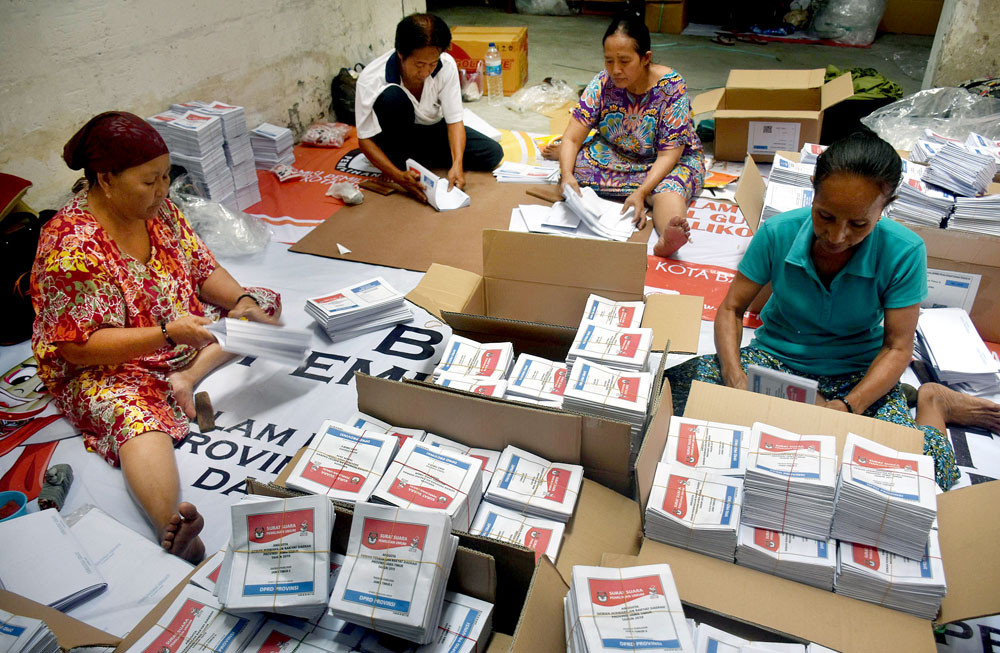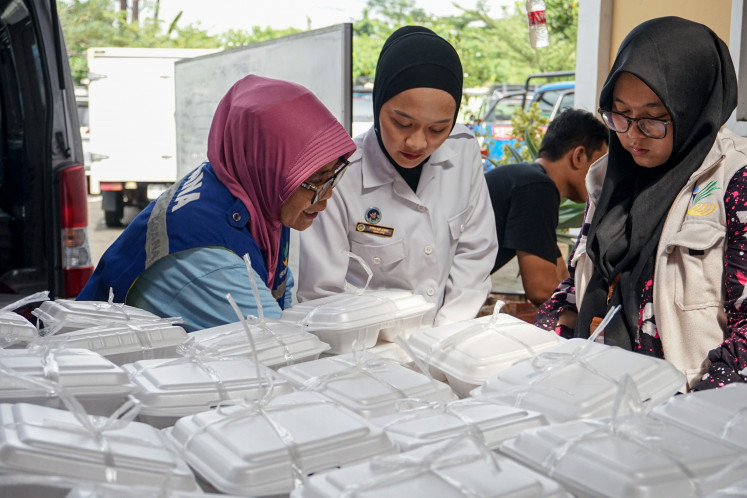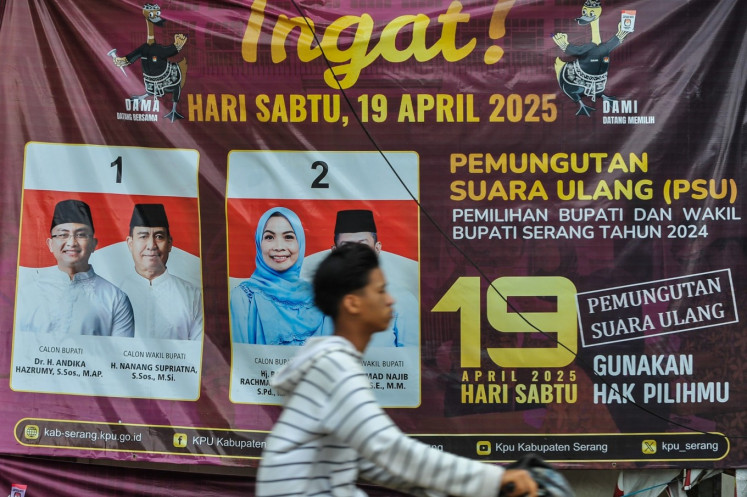Popular Reads
Top Results
Can't find what you're looking for?
View all search resultsPopular Reads
Top Results
Can't find what you're looking for?
View all search resultsDiverting focus on local legislative election
Good candidates for local legislatures would be a huge boost to the politics of regional budgets, especially in the fulfillment of basic rights of the community such as education and health.
Change text size
Gift Premium Articles
to Anyone
 Helping hands: Volunteers fold ballots that will be used in the election of East Java Legislative Council (DPRD) members at a General Elections Commission (KPU) warehouse in Malang, East Java. KPU Malang is in process of folding of 1.27 million ballots for the election of DPRD East Java and House of Representative members. (The Jakarta Post/Aman Rochman)
Helping hands: Volunteers fold ballots that will be used in the election of East Java Legislative Council (DPRD) members at a General Elections Commission (KPU) warehouse in Malang, East Java. KPU Malang is in process of folding of 1.27 million ballots for the election of DPRD East Java and House of Representative members. (The Jakarta Post/Aman Rochman)
A
political system can be said to generate sufficient political representation if it can accommodate different political preferences of the constituents to the maximum. The one man one vote supposedly enables differences between individual characteristics to be properly reflected.
But at the national level, in a country as vast as Indonesia, those ideals of democracy are difficult, if not impossible, to realize. For this reason, the state needs an electoral law that at least can bring about results that represent intersections of as many preferences as possible.
However, requirements for representations sometimes go too far. For example, the presidential threshold is set so high that political parties have to coalesce to propose candidates. As a result, the choices for the people are limited, that we face just two presidential candidates, both in the 2014 the upcoming April general elections.
The presidential election will just be a rematch between the two candidates. But there are many significant differences between the two after five years have passed.
Today Joko “Jokowi” Widodo, as the incumbent, can be judged by many indicators of his sectoral program success or failure, depending on one’s judgment
On the other hand his challenger, Prabowo Subianto, has a checkered past and his supporting parties’ platform raises doubts. Abstention, or golput, has become a popular movement, again.
The problem of insufficient political representation also risks the legislative election producing an illegitimate legislature. With the higher parliamentary threshold, more parties may be kicked out of the House of Representatives. A survey by Kompas revealed that only 5 or 6 of 16 political parties contesting the April election would beat the 4 percent threshold. That means millions of votes for 10 to 11 eliminated parties will not be taken into account.
The legislative elections were actually designed to strengthen the presidential system. With less parties making it to the House, there are fewer interests that need to be accommodated in the policy-making and law-making process, which is by no means ideal for our highly diverse nation-state.
Fortunately, insufficient representation seems to only occur at the national level. Elections for regional legislature members were designed to be less complicated than the election for House members, providing all political parties contesting the election have access to the seat distribution mechanism after the vote count.
This simple model is expected to be able to accommodate the distinctive interests of the people in each region. The election of provincial and regency/municipal councils also takes into account the individual capacity of candidates. A more capable candidate does not depend on the success of his or her party in gaining votes. Thus local legislative elections have the potential to produce more benefits for the people, since the representatives and voters have closest access to each other, in efforts to fulfill people's welfare.
Indonesia as "a unitary state with wide regional autonomy" contains the constitutional mandate allowing considerable autonomy to regions except for national defense and security, national monetary and fiscal issues, religion, the national judiciary and foreign investment.
Thus instead of spending all focus on national election contestations that are often unreachable, civil society movements also need to make local legislative elections a concern. It is important for us to invest in it. We should be able to allocate resources to candidates who have a good track record and help finance their political costs. Thus, the opportunity to intervene in the technical and local policy-making process is more likely to happen.
This strategy has been tried by various civil movement organizations. For example, the Indigenous Peoples Alliance of the Archipelago (AMAN) helped to send 157 legislative candidates in the 2019 election, where 109 people are contesting the regental and municipal level while 25 others are fighting at the provincial level. Thus, the interests of indigenous peoples, the subject of AMAN's movement, can take part in the law-making discourse at the regional level, especially related to the recognition of indigenous people’s rights which require relevant regional regulations.
The results may not yet be seen, but collaboration at the regional level like this is a step forward to realizing local people’s interests. Good candidates for local legislatures would be a huge boost to the politics of regional budgets, especially in the fulfillment of basic rights of the community such as education and health. These things are often inaccessible by the national government and national legislature, so spending all the focus only on national representatives is ineffective for voters and people’s movements.
***
The writer is the head of law and human rights department on the national board of Indonesian Association of Gorontalo Students (HPMIG), and is a Master graduate in constitutional law from Universitas Indonesia (UI).








